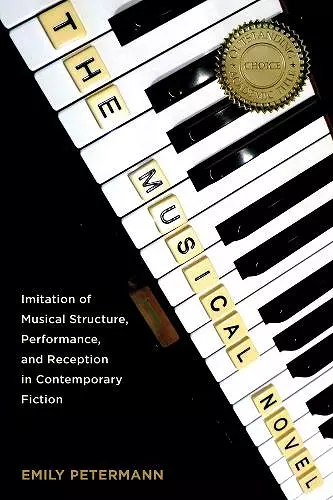The Musical Novel
Imitation of Musical Structure, Performance, and Reception in Contemporary Fiction
Format:Paperback
Publisher:Boydell & Brewer Ltd
Published:1st Mar '18
Currently unavailable, and unfortunately no date known when it will be back

WINNER: 2014 CHOICE Outstanding Academic Title Award Analyzes two groups of "musical novels" -- novels that take music as a model for their construction -- including jazz novels by Toni Morrison and Michael Ondaatje, and novels based on Bach's Goldberg Variations. What is a "musical novel"? This book defines the genre as musical not primarily in terms of its content, but in its form. The musical novel crosses medial boundaries, aspiring to techniques, structures, and impressions similar tothose of music. It takes music as a model for its own construction, borrowing techniques and forms that range from immediately perceptible, essential aspects of music (rhythm, timbre, the simultaneity of multiple voices) to microstructural (jazz riffs, call and response, leitmotifs) and macrostructural elements (themes and variations, symphonies, albums). The musical novel also evokes the performance context by imitating elements of spontaneity that characterize improvised jazz or audience interaction. The Musical Novel builds upon theories of intermediality and semiotics to analyze the musical structures, forms, and techniques in two groups of musical novels, which serve as case studies. The first group imitates an entire musical genre and consists of jazz novels by Toni Morrison, Albert Murray, Xam Wilson Cartiér, Stanley Crouch, Jack Fuller, Michael Ondaatje, and Christian Gailly. The secondgroup of novels, by Richard Powers, Gabriel Josipovici, Rachel Cusk, Nancy Huston, and Thomas Bernhard, imitates a single piece of music, J. S. Bach's Goldberg Variations. Emily Petermann is Assistant Professor of American Literature at the University of Konstanz.
[R]ecommends itself to literary or music libraries, as well as to all those interested in the sounds and structures of the contemporary Anglo-American novel. * AMERIKASTUDIEN *
[A] necessary work of methodology, refining and clarifying prior attempts at intermedial analysis into a toolset that offers much as a foundation for future works of criticism. * H-MUSIC *
For the scholar of musical fiction, this book is of great interest. * JIVE-TALK.COM *
[O]f significant interest not only to the literary scholar but also to the philosopher of art. . . . Petermann's exploration of th[e] literary subgenre [of the 'musical novel'], defined as 'musical not primarily in terms of its content, but in its very form' (p.2) invites us to rethink a series of classical problems - the essence of music, boundaries of art forms, musical sense and meaning, the relation between music and language - through the lens of these peculiar textual artworks. * UNIVERSA. RECENSIONI DI FILOSOFIA *
Selected as a CHOICE Outstanding Academic Title of 2014 * . *
[A]n important contribution to the field of word and music studies. . . . Petermann offers a theory of intermediality that standardizes the features of novels that 'transpos[e] elements of music.' . . . . [E]xpertly crafted. . . . If for no other reason, one should read The Musical Novel to enjoy the author's elegant language --Petermann's prose was music to this reviewer's ears. Highly recommended. * CHOICE *
Petermann makes a strong and patient case for a thriving tradition of intermediality, and one - this is what distinguishes her book from earlier passes at the subject - that crucially involves audience expectations and reception as part of the equation: knowing the Goldberg Variations or a particular jazz standard provides a subliminal framework for fictional improvisation which a reader unfamiliar with the music might lack. * TLS *
The musical knowledge that Petermann displays throughout her book is as sound as her literary background: this promotes illuminating insights for readers coming from both worlds. . . . [Her] theory of intermediality is entirely persuasive and plausible, and as such it is highly useful to anybody seeking to expand further the field of word and music studies. Overall . . . a most thoughtful and comprehensive formalist approach to intermediality in general and the musical novel in particular. * MUSIC & LETTERS *
ISBN: 9781640140271
Dimensions: unknown
Weight: 362g
250 pages